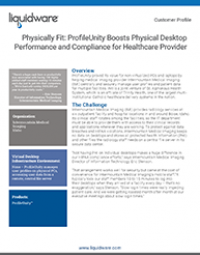ProfileUnity reduces Clinician Login Time to Seconds, saving IMI thousands and improving patient care
Intermountain Medical Imaging (IMI) provides radiology services from six outpatient facility and hospital locations in and around Boise, Idaho. Its clinical staff rotates among the facilities, so the IT department must be able to provide them with access to their clinical records and applications wherever they are working. To protect against data breaches and HIPAA violations, Intermountain Medical Imaging keeps no data on desktops and stores all protected health information (PHI) and other files the radiology staff needs on a central file server in its secure data center. This arrangement works well for security but came at the cost of convenience for Intermountain Medical Imaging’s mobile staff who typically took 10 to 15 minutes to log into their desktops. These long login times were causing great dissatisfaction among users and executives, but even worse was impeding patient care.
A solution had to be found.
Even though IMI does not run virtualized desktops, it discovered that its best option for improving slow login times was Liquidware’s ProfileUnity, the platform-agnostic user profile and environment management solution that is an industry leader for Windows desktop management. ProfileUnity is known for enabling extremely fast logins. ProfileUnity can be used on physical or virtual desktops and with profiles that are stored locally, in an offsite enterprise data center or private cloud, or in the Amazon AWS, Google Cloud or Microsoft Azure public clouds.
Once the organization integrated ProfileUnity, the average login time fell from 10 – 15 minutes to between 30 and 40 seconds.
The improvement has been very well received by IMI’s clinicians and has boosted morale. It has also boosted the bottom line. Since the organization began using ProfileUnity, it has received far less help desk tickets related to slow logins – it previously often received 15 to 20 per day. Not having to support those tickets eliminated the need for one full-time desktop support position.
Improved login performance has made an even bigger impact on the staff that serves patients now that highly skilled staff clinicians no longer have to wait to get into their computers. The organization estimates it saves $450,000 each year in productivity costs.

